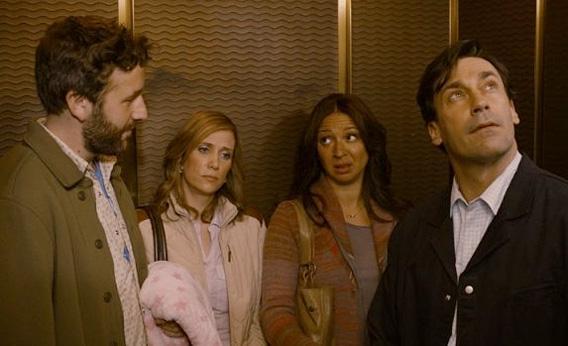The pleasant but overfamiliar romantic comedy Friends With Kids (Lionsgate Films) is entirely the brainchild of Jennifer Westfeldt (the writer and star of 2001’s Kissing Jessica Stein) who directed, co-produced, wrote the script, and plays the leading role of Julie, a New Yorker in her late 30s who’s hankering for a child but not yet ready to settle down with a man. Julie’s platonic best friend since college, Jason (Adam Scott), who lives a few floors above her in one of those miraculously affordable buildings seen only in movies, proposes a madcap plan that the two of them agree on with improbable alacrity: They’ll conceive a child together and raise it as single co-parents, while continuing to look for the true loves of their lives.
Why reproduction would appeal to either Jason or Julie is unclear, given that their once fun-loving friends have all been turned into either bitter drunks or frumpy harridans by the experience of parenthood. Leslie and Alex (Maya Rudolph and Chris O’Dowd) can barely stay awake through a dinner party, while Missy and Ben (Kristen Wiig and Jon Hamm), once so hot for each other they regularly disappeared into restaurant bathrooms for a quickie, now quietly trade insults over too many glasses of scotch.
Improbably enough, Julie and Jason’s babymaking plan comes off without a hitch—so easily, in fact, that Julie’s entire pregnancy zips by in a frustrating elision—and they soon have an angelic son named Joe, who’s less a human baby than a chubby-cheeked narrative device. One of this movie’s more depressing ironies is that, for all the characters’ obsession with the child as symbol—of adult commitment, emotional growth, “what really matters,” etc.—Westfeldt demonstrates little interest in actual children.
Julie and Jason surprise their dubious friends by being totally cool with the pals-as-parents setup—until they each meet other potential partners. Jason takes up with a hypersexual, child-phobic Broadway dancer (Megan Fox), while Julie falls for a hunky, absurdly nurturing divorced dad (Ed Burns). As required by rom-com tradition, the friends bring their new loves along on a group ski weekend where jealousies are fanned and dark truths drunkenly told.
The darkest and drunkest of the truth-tellers is Jon Hamm’s Ben, who, after having spoken maybe five times in the movie up to this point, suddenly rips into Jason and Julie about the irresponsibility of their decision to raise a child together, then confesses to the angry, sexless hell that his marriage has become, mortifying everyone at the table. The intensity of Hamm’s speech disrupts the movie’s smooth, glib surface—it’s a tonal break that makes us realize, by contrast, how generic and sitcom-y most of the film’s dialogue has been. It may be that Westfeldt, who is Hamm’s romantic partner in real life, wanted to give her man at least one big scene, and he certainly has the chops to carry it off. But the unintentional effect of this brief glimpse into real adult disappointment and heartbreak is that, when we return to the formulaic, easily solved problems of Julie and Jason (dudes, you’re meant for each other, get a room), we care less than we did before.
Friends With Kids isn’t an awful movie by any means: It’s a polished, palatable yuppie rom-com in the Woody Allen-lite tradition, sort of When Harry Met Sally minus the snappy Nora Ephron dialogue (and back off, haters, because I’m very fond of When Harry Met Sally). But Westfeldt’s script sets its sights disappointingly low, given the comic gifts of her cast. Adam Scott, a Parks & Recreation regular, makes a fine screwball leading man, even if he’s slightly mismatched with the delicate, tremulous Westfeldt. And whenever Hamm and Wiig or Rudolph and O’Dowd wandered through a scene, I wished the movie would veer off and start exploring their characters’ child-ravaged marriages rather than the lead couple’s dopey dilemma.
There’s been some disagreement among critics about this movie’s final lines, in which Julie and Jason, having finally realized they belong together, exchange a filthy-yet-romantic promise of impending sexual fulfillment. In spite of my general distaste for Friends With Kids, let me cast my vote on the side of those who liked the ending. I wish more of the film had had that scene’s fresh mixture of casual banter and breathless intimacy, instead of sounding like half-remembered dialogue from a movie we’ve all seen too many times before.
